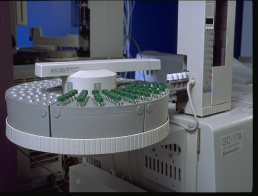MSc Programs (Thesis and Non-Thesis)
Both Thesis (T) and Non-Thesis (N) MSc. programs are offered by the Department. Although this section deals largely with the details of the Thesis MSc. program, it may be useful when one applies to the Faculty of Graduate and Postdoctoral Studies to designate the MSc. Non-thesis as an alternate choice, as there is no guarantee that a supervisor for the thesis based MSc. Program will be available. As such, your application will address both options, thus avoiding re-applying. Please note that there is no funding available to support students financially for the Non-Thesis MSc.
- Admission requirements
- Qualifying students
- Course and credit requirements
- Advisory committee
- Residencey requirements
- Research program
- Program options
- Thesis
1. Admission requirements
A BSc in Food Science or a related discipline (e.g., Chemistry, Biochemistry, Microbiology, Engineering) with a GPA of 3.2 or better is required to be considered for graduate studies. Those entering without sufficient background in Food Science may be required to take a qualifying term or year (MSc, Qualifying) as determined by the Graduate Admissions Coordinator and graduate advisor.
2. Course and credit requirements

For candidates entering the MSc program without restrictions (i.e., not requiring a qualifying term/year), the MSc degree consists of 45 graduate credits. These credits are obtained through a combination of graduate courses and a research thesis. Course Requirements: (a) six (6) credits as graduate seminar courses and (b) a minimum of nine (9) additional course credits usually at the 500/600 level of which, in special circumstances, up to three (3) credits may be at a lower level. Thesis Requirements: MSc Literature Review (8 credits), MSc Research Protocol (7 credits), MSc Thesis (15 credits). The Literature Review and Research Protocol, thesis requirements, are courses which require the submission and adjudication of written formal documents which are graded on a Pass/Fail basis and credits awarded accordingly. In special circumstances, a continuance (HH) may be given in the Literature Review and Research Protocol if the deadline is not met for these courses. Failure in any portion of the requirements (courses, seminars or thesis related requirements) will lead to a request to withdraw from the MSc program. The last fifteen (15) credits for the thesis portion are granted by Graduate Faculty when the thesis has been passed. The minimum residence time for an MSc degree is three academic terms and students are expected to complete their studies within this time frame.
3. Residence requirements
Residence requirement refers to the number of terms (or years) students must be registered on a full-time basis to complete their program. Students are not permitted to graduate until they have fulfilled the residence requirement (or paid the corresponding fees) in their program.
The Master of Science (Food Science) has a minimum residence requirement of three full-time terms.
This designated period of residence represents a minimum time requirement. There is no guarantee that the work for the degree can be completed in this time. Students may register for such additional terms as are needed to complete the program.
4. Program options
Each student must be registered for a minimum of 12 credits per term to qualify as a full time graduate student and this limits the approach one can take in selecting courses within the three terms allotted. It is recommended that students take FDSC 690 (8 credits) and FDSC 691 (7 credits) in their first term and FDSC 695 (graduate seminar 1) in their second term. Students having taken a qualifying term may credit themselves any graduate courses taken during their qualifying term and distribute them within the framework below to assist in meeting the 12 credit minimum. This can only be done when these qualifying credits have been documented on the Graduate and Postdoctoral Studies Office decision form under "Other" in the Conditions of Acceptance section. It is expected that each student will outline his/her complete MSc program with their supervisor. Forms are available to assist in planning your program and ensuring all the requirements will be met.
5. Qualifying students
Those students whose background or academic record is considered inadequate to proceed directly into the MSc program will be requested to take a qualifying term or terms to orient them to the field of Food Science. This entails taking selected undergraduate and/or graduate courses as determined by their Advisory Committee. Those courses successfully completed which meet some of the requirements of the MSc program as outlined in Option A or B will be credited to their program as outlined above in 3, Program Options.
6. Advisory committee
Each student will have an Advisory Committee, normally consisting of two members of the departmental faculty, including the student's research advisor, who serves as the chairman. Advisory committees are expected to meet with the student twice a year to discuss the student's course requirements and research progress and prepare a report on a semi-annual basis.
7. Research program
Food Science and Agricultural Chemistry research programs for the Master's degree normally require three academic terms, with a maximum of two years. There are limitations to the time which can be taken to finish a postgraduate degree and it is departmental policy to adhere to the new Graduate and Postdoctoral Studies Office regulations of limiting additional sessions.
8. Thesis
(a) The presentation of a thesis is a requirement of all Master's candidates.
(b) The thesis should be prepared according to the guidelines provided by the Graduate and Postdoctoral Studies Office.
(c) The thesis will be evaluated by one internal examiner, who may be a member of the student's Advisory Committee and/or by one external examiner. There is no oral examination for the Master's thesis, however a seminar presentation on the thesis subject matter is possible.
(d) Students should refer to the Calendar of Dates to determine deadlines for submitting their thesis.